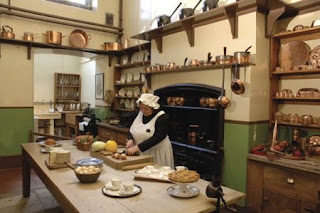by Sheila Connolly
"Had we but world enough and time…" Andrew Marvell began his poem, To His Coy Mistress, with that line, in the mid-17th century, and while the rest of the poem wanders off happily into ramblings about fleshly love, that first line is lovely, and sticks in my mind (with a lot of other assorted stuff).
But lately, being limited in my mobility, which in turn limits the range of my activities, my take on time has changed. As I’ve said here before, I’ve been doing a lot more reading. The past week I’ve torn though The Dirt on Clean, by Katherine Ashenburg (which I bought when it came out in 2008 and have only just arrived at), and I’ve started Christopher Kimball’s Fannie’s Last Supper, which was published last year.
On the surface these would seem to be very different books, but both have made me consider how people in any culture choose to spend their time. Perhaps “choose” is too limiting a term, because for a long time most people did whatever they had to do to survive, which consisted mainly of hunting or growing food, procreating, and dying early. No doubt there was little discussion about how to best use leisure time—because there wasn’t any.
Ashenburg addresses attitudes toward personal hygiene, and how different cultures perceived cleanliness over history. Indoor plumbing has been around for a long time (the Romans did a pretty good job with that, as did some religious orders like the Cistercians in the Middle Ages), but its perceived importance has fluctuated widely. At times people thought bathing was evil, and changed their clothing rarely. But the pendulum swung and now many people are obsessed with both personal odors and germs. Have you looked at the range of settings on a new washer? It takes a degree in computer science to figure out how to program one for a simple load. And if you’re supposed to treat each kind of fabric, each color, separately—how much time are you spending at it?
Kimball’s book is interesting because the author takes it upon himself to recreate a (high-end) meal based upon the Fannie Farmer Boston Cooking-School Cookbook from 1896. This involved twelve courses, each incredibly elaborate, all cooked on an authentic cast-iron stove. The author, clearly passionate about both cooking and the Victorian era, also includes a wealth of peripheral detail (who knew that Aunt Jemima Pancake Mix existed before 1900?).
Admittedly this event does not represent the way most people in the country approached making a meal; instead it captures a particular moment in urban, upper-middle-class fashion. In this rarified niche, It took well over two hours to consume such a meal, and that was with servants presenting each course and clearing away the detritus from the prior one. More servants operated below stairs, chopping, peeling, simmering, etc., etc., to create individual dishes designed to impress and delight—and to disappear within minutes, to be followed by the cleanup (imagine all those dishes!). It didn’t last, though. Servants became harder and harder to find, so the woman of the house began to assume a greater role in shopping and cooking, and then there were all those wonderful time-saving machines and packaged foods that came along in short order.
But for all of that, domestic service was a way to enter American culture. For a time a lot of cooks and maids were Irish, and that included my father’s mother, two of her sisters, and two of my father’s father’s sisters, all of whom arrived in New York shortly after 1900. The house I live in now, which in 1910 housed five or six unrelated people in addition to the owners, also had a servant who was Irish—her room was in the unheated attic. By 1920 there was no servant.
Modern perceptions of time, particularly “free” time, keep changing. Take reading (please!). These days it is a luxury to sit down and immerse yourself in a book, to lose yourself in an alternate universe or a wealth of factual information, purely for your own pleasure. The recent and continuing evolution of the ebook is both a blessing and a curse. It’s a blessing because books are now available instantly, in a form that can be carried anywhere; it’s a curse because readers now snatch minutes here and there to read a paragraph or a page, before we’re interrupted by something else. Children, teenagers, twenty-somethings reduce their lives to 140-character tweets in an endless stream.
Does this change how we read, and how we write books? Will the rising generation have the attention span of a gnat? Must we as writers make our stories bigger, brighter, faster, just to keep them fresh in an intermittent reader’s mind? There are those who say that we mystery writers must put the body in the first chapter, and add a hook to the end of each chapter, to keep our readers engaged. We’re happy that they’re reading at all, but how must we adapt to keep them reading?
Friday, April 22, 2011
Subscribe to:
Post Comments (Atom)












2 comments:
Truly 'free' time is an increasingly scarce commodity. Even when not at my day job - which also involves work taken home far more often than I care for - there are family obligations, church & civic obligations, my own writing projects ... it's getting to be a rare time, indeed, when I can sit and pursue my favorite pastime - a well-written book.
What happened to all that leisure time modern technology would bring that they told us all about back in the Fifties??
Larry, we're using all that free time sitting at computers surfing the internet. Of course we don't have time to read. We have to keep our Facebook pages updated.
And what happened to the "paperless office" computers were supposed to give us? Now that it's so easy to print out anything and everything, I waste many times more paper than before.
Post a Comment